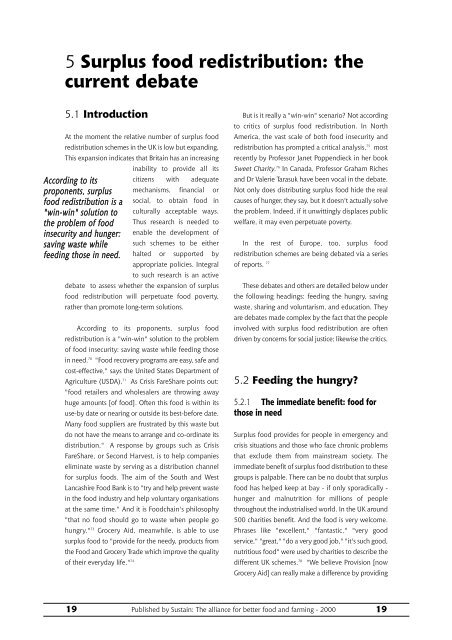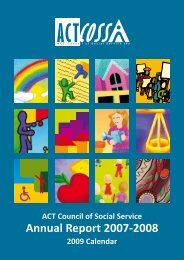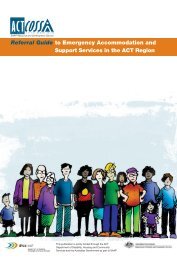Too much and too little? Debates on surplus food redistribution
Too much and too little? Debates on surplus food redistribution
Too much and too little? Debates on surplus food redistribution
You also want an ePaper? Increase the reach of your titles
YUMPU automatically turns print PDFs into web optimized ePapers that Google loves.
5 Surplus <strong>food</strong> redistributi<strong>on</strong>: the<br />
current debate<br />
5.1 Introducti<strong>on</strong><br />
At the moment the relative number of <strong>surplus</strong> <strong>food</strong><br />
redistributi<strong>on</strong> schemes in the UK is low but exp<str<strong>on</strong>g>and</str<strong>on</strong>g>ing,<br />
This expansi<strong>on</strong> indicates that Britain has an increasing<br />
inability to provide all its<br />
citizens with adequate<br />
mechanisms, financial or<br />
social, to obtain <strong>food</strong> in<br />
culturally acceptable ways.<br />
Thus research is needed to<br />
enable the development of<br />
such schemes to be either<br />
halted or supported by<br />
appropriate policies. Integral<br />
to such research is an active<br />
debate to assess whether the expansi<strong>on</strong> of <strong>surplus</strong><br />
<strong>food</strong> redistributi<strong>on</strong> will perpetuate <strong>food</strong> poverty,<br />
rather than promote l<strong>on</strong>g-term soluti<strong>on</strong>s.<br />
AAccccoorrddiinngg t<str<strong>on</strong>g>too</str<strong>on</strong>g> iittss<br />
pprrooppo<strong>on</strong>neennttss,, ssuurrpplluuss<br />
ffoooodd rreeddiissttrriibbuuttiio<strong>on</strong>n iiss aa<br />
""wwiinn--wwiinn"" ssoolluuttiio<strong>on</strong>n t<str<strong>on</strong>g>too</str<strong>on</strong>g><br />
tthhee pprroobblleemm ooff ffoooodd<br />
iinnsseeccuurriittyy aanndd hhuunnggeerr::<br />
ssaavviinngg wwaassttee wwhhiillee<br />
ffeeeeddiinngg tthhoossee iinn nneeeedd..<br />
According to its prop<strong>on</strong>ents, <strong>surplus</strong> <strong>food</strong><br />
redistributi<strong>on</strong> is a "win-win" soluti<strong>on</strong> to the problem<br />
of <strong>food</strong> insecurity: saving waste while feeding those<br />
in need. 70 "Food recovery programs are easy, safe <str<strong>on</strong>g>and</str<strong>on</strong>g><br />
cost-effective," says the United States Department of<br />
Agriculture (USDA). 71 As Crisis FareShare points out:<br />
"<strong>food</strong> retailers <str<strong>on</strong>g>and</str<strong>on</strong>g> wholesalers are throwing away<br />
huge amounts [of <strong>food</strong>]. Often this <strong>food</strong> is within its<br />
use-by date or nearing or outside its best-before date.<br />
Many <strong>food</strong> suppliers are frustrated by this waste but<br />
do not have the means to arrange <str<strong>on</strong>g>and</str<strong>on</strong>g> co-ordinate its<br />
distributi<strong>on</strong>." A resp<strong>on</strong>se by groups such as Crisis<br />
FareShare, or Sec<strong>on</strong>d Harvest, is to help companies<br />
eliminate waste by serving as a distributi<strong>on</strong> channel<br />
for <strong>surplus</strong> <strong>food</strong>s. The aim of the South <str<strong>on</strong>g>and</str<strong>on</strong>g> West<br />
Lancashire Food Bank is to "try <str<strong>on</strong>g>and</str<strong>on</strong>g> help prevent waste<br />
in the <strong>food</strong> industry <str<strong>on</strong>g>and</str<strong>on</strong>g> help voluntary organisati<strong>on</strong>s<br />
at the same time." And it is Foodchain's philosophy<br />
"that no <strong>food</strong> should go to waste when people go<br />
hungry." 73 Grocery Aid, meanwhile, is able to use<br />
<strong>surplus</strong> <strong>food</strong> to "provide for the needy, products from<br />
the Food <str<strong>on</strong>g>and</str<strong>on</strong>g> Grocery Trade which improve the quality<br />
of their everyday life." 74<br />
19<br />
But is it really a "win-win" scenario? Not according<br />
to critics of <strong>surplus</strong> <strong>food</strong> redistributi<strong>on</strong>. In North<br />
America, the vast scale of both <strong>food</strong> insecurity <str<strong>on</strong>g>and</str<strong>on</strong>g><br />
redistributi<strong>on</strong> has prompted a critical analysis, 75 most<br />
recently by Professor Janet Poppendieck in her book<br />
Sweet Charity. 76 In Canada, Professor Graham Riches<br />
<str<strong>on</strong>g>and</str<strong>on</strong>g> Dr Valerie Tarasuk have been vocal in the debate.<br />
Not <strong>on</strong>ly does distributing <strong>surplus</strong> <strong>food</strong> hide the real<br />
causes of hunger, they say, but it doesn't actually solve<br />
the problem. Indeed, if it unwittingly displaces public<br />
welfare, it may even perpetuate poverty.<br />
In the rest of Europe, <str<strong>on</strong>g>too</str<strong>on</strong>g>, <strong>surplus</strong> <strong>food</strong><br />
redistributi<strong>on</strong> schemes are being debated via a series<br />
of reports. 77<br />
These debates <str<strong>on</strong>g>and</str<strong>on</strong>g> others are detailed below under<br />
the following headings: feeding the hungry, saving<br />
waste, sharing <str<strong>on</strong>g>and</str<strong>on</strong>g> voluntarism, <str<strong>on</strong>g>and</str<strong>on</strong>g> educati<strong>on</strong>. They<br />
are debates made complex by the fact that the people<br />
involved with <strong>surplus</strong> <strong>food</strong> redistributi<strong>on</strong> are often<br />
driven by c<strong>on</strong>cerns for social justice; likewise the critics.<br />
5.2 Feeding the hungry?<br />
5.2.1 The immediate benefit: <strong>food</strong> for<br />
those in need<br />
Surplus <strong>food</strong> provides for people in emergency <str<strong>on</strong>g>and</str<strong>on</strong>g><br />
crisis situati<strong>on</strong>s <str<strong>on</strong>g>and</str<strong>on</strong>g> those who face chr<strong>on</strong>ic problems<br />
that exclude them from mainstream society. The<br />
immediate benefit of <strong>surplus</strong> <strong>food</strong> distributi<strong>on</strong> to these<br />
groups is palpable. There can be no doubt that <strong>surplus</strong><br />
<strong>food</strong> has helped keep at bay - if <strong>on</strong>ly sporadically -<br />
hunger <str<strong>on</strong>g>and</str<strong>on</strong>g> malnutriti<strong>on</strong> for milli<strong>on</strong>s of people<br />
throughout the industrialised world. In the UK around<br />
500 charities benefit. And the <strong>food</strong> is very welcome.<br />
Phrases like "excellent," "fantastic," "very good<br />
service," "great," "do a very good job," "it's such good,<br />
nutritious <strong>food</strong>" were used by charities to describe the<br />
different UK schemes. 78 "We believe Provisi<strong>on</strong> [now<br />
Grocery Aid] can really make a difference by providing<br />
Published by Sustain: The alliance for better <strong>food</strong> <str<strong>on</strong>g>and</str<strong>on</strong>g> farming - 2000 19













